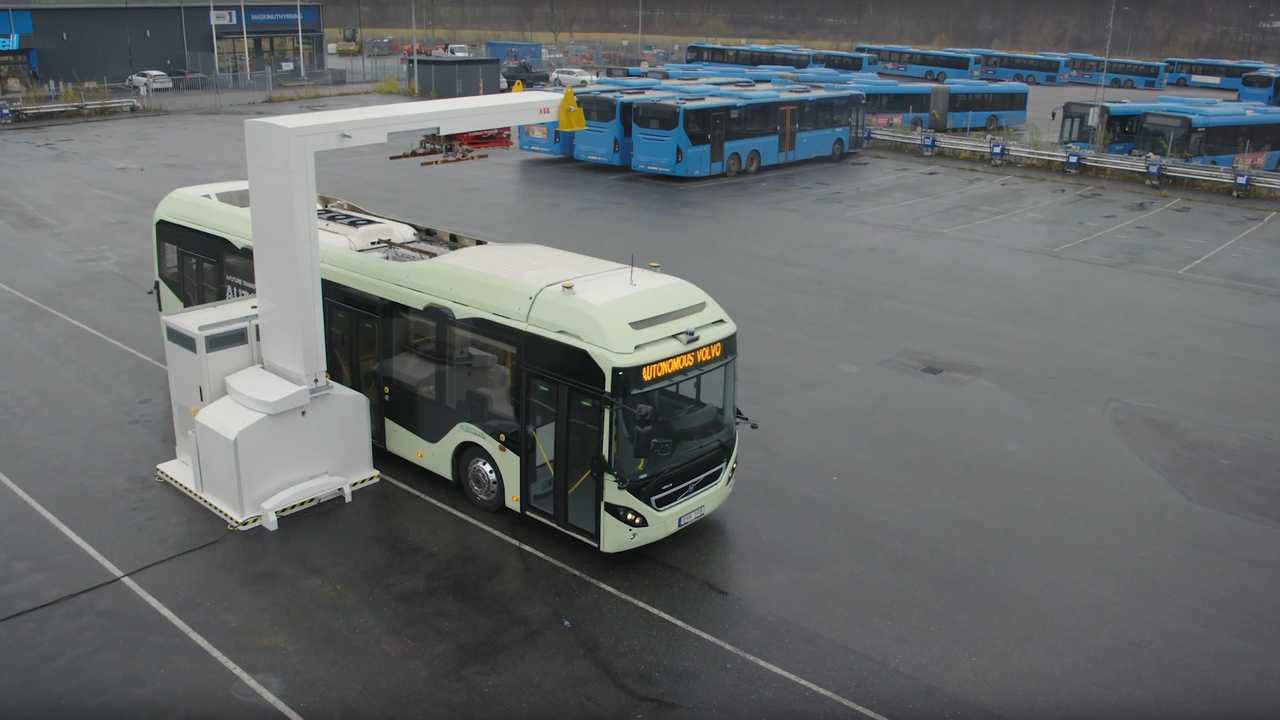Making buses self-driving at depots sounds like a great first application.
Volvo Buses demonstrated autonomous driving of an electric bus at a bus depot, which happens to be the first such demo at at real depot, used by bus operator Keolis, outside of Gothenburg, Sweden.
The Swedish manufacturer notes that it will take years to make buses self-driving on public roads but depots are a fairly simple application for autonomous driving as the environment is known, with predictable and repetitive traffic flows.
Having an option of autonomous driving, bus operators would be able to order buses to park, drive to the wash or charging station, all by itself.
It’s expected that bus operators will be able to purchase such systems within 5-10 years.
“During the demonstration, the fully-electric 12 m autonomous bus successfully drove itself between the parking bay and several workstations including cleaning, servicing and electric charging, before parking itself in the correct bay – all while carrying passengers.”
Håkan Agnevall, President of Volvo Buses said:
“This marks a very important step in our autonomous journey as we now have successfully shown the commercial benefits an autonomous solution can deliver in a bus depot. Autonomous buses in depots bring new benefits such as more efficient traffic flows, higher productivity, less damages and improved safety. The industry-common charging interface OppChargeTM is ideally suited for autonomous charging, eliminating the need to connect power cables to the bus in the depot.”

Volvo Buses demonstrates electric autonomous solution for bus depot
For the first time, Volvo Buses shows the significant potential of autonomous buses in depot. The live demonstration, one of the world’s first for a 12 m electric and autonomous bus at a bus depot, represents an important milestone in Volvo Buses’ autonomous journey towards safer, cleaner and more efficient public transport.
The demonstration, held together with bus operator Keolis, took place at Keolis’ bus depot just outside of Gothenburg, Sweden. During the demonstration, the fully-electric 12 m autonomous bus successfully drove itself between the parking bay and several workstations including cleaning, servicing and electric charging, before parking itself in the correct bay – all while carrying passengers.
“This marks a very important step in our autonomous journey as we now have successfully shown the commercial benefits an autonomous solution can deliver in a bus depot,” says Håkan Agnevall, President of Volvo Buses. “Autonomous buses in depots bring new benefits such as more efficient traffic flows, higher productivity, less damages and improved safety. The industry-common charging interface OppChargeTM is ideally suited for autonomous charging, eliminating the need to connect power cables to the bus in the depot.”
“The new mobility technology will be more common in 5-10 years. Bringing the new technology into today’s depot business and developing it will not only speed up development, it will improve our performance, ensuring that our passengers benefit over the coming years,” says Jan Kilström, CEO at Keolis in Sweden.
ABB, who also participated in the demonstration, sees opportunities for the future.
“ABB is fully committed to building a zero emission future and sustainable public transportation is a vital part of this. We have the products and the solutions to deliver electricity from generation to the point of consumption in a safe, smart and sustainable way. ABB’s high-power electric bus chargers with automated rooftop connection enable the efficient charging of autonomous buses, and we look forward to the future of this transport innovation together with Volvo Buses”, says Mats Peterson, Local Business Manager for ABB Electrification in Sweden.
The event was just the latest in a number of successful demonstrations of autonomous buses carried out by Volvo Buses in recent years. This demonstration was one of the first to take place in a real bus depot – one of the areas that Volvo Buses believes offers the greatest potential for automation.
“We are still many years away from seeing fully-autonomous buses on public roads, but since bus depots are confined areas with predictable and repetitive traffic flows, we see autonomous buses being used there much sooner,” says Håkan Agnevall. “Working together with Keolis has given us this unique opportunity to test an autonomous bus in real conditions and will help us drive the development of autonomous solutions forward.”
Volvo Buses is at the forefront of the development of autonomous buses. In ten years, an additional one billion people will most likely be living on the planet, most of whom will live in cities. This will create even greater demands on public transport, infrastructure and urban planning, which in turn needs to be managed in an even more sustainable and efficient way.
Volvo Buses believes that part of the answer will be connected, autonomous and electric buses. Together with partners, Volvo Buses pioneers sustainable public transport solutions to meet these challenges.
